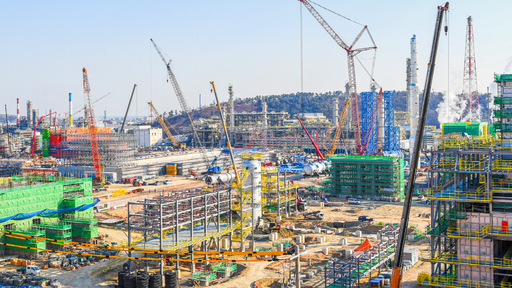


Amid the global tariff war sparked by U.S. President Donald Trump's policies, international oil prices have plummeted and the value of the won has fallen, causing divergent responses among domestic refining companies. Some are viewing the oil price decline as an opportunity to increase investments, while others are focusing on securing financial stability, with differing strategies in play.
As of the 9th, Brent crude was trading at $61.88 per barrel. After China announced it would impose a 84% retaliatory tariff on U.S. products starting on the 10th, Brent crude dropped to $58.40 per barrel during the session. This marked the first time the $60 mark was breached since the COVID-19 pandemic and U.S.-China tensions in 2020. U.S. West Texas Intermediate (WTI) also showed weakness, closing at $62.35 per barrel on the same day, and dipping below $60 to $59.58 on the previous day.
The uncertainty in the refining industry has further increased due to the high exchange rate. As of 3:30 p.m., the exchange rate stood at 1,456.4 won to the dollar. While the date for the implementation of the reciprocal tariffs has been delayed by three months, the market remains tense, with concerns that the rate could surpass 1,500 won.
The Korea International Trade Association has forecasted that if the exchange rate rises by 10%, the cost of goods in the 'coal/oil and natural gas' sectors will increase by an average of 3.39%. Typically, refining companies reflect exchange rate fluctuations in product prices, but with both high exchange rates and growing concerns about an economic slowdown, the risk of reduced demand and falling refining margins cannot be ignored, making the impact negative for the industry.
As industry uncertainties increase, refining companies are adopting different strategies in response. S-Oil and SK Innovation are making large-scale investments in preparation for a recovery in demand. In particular, S-Oil is undertaking the Shahin Project, which is the largest investment in the history of the domestic petrochemical industry, amounting to 9.258 trillion won. Once the Shahin Project becomes fully operational, S-Oil will produce basic petrochemical products such as 1.8 million tons of ethylene, 770,000 tons of propylene, 200,000 tons of butadiene, and 280,000 tons of benzene.
SK Innovation is considering building self-generation facilities at its Ulsan complex and is exploring the option of directly producing LNG. This aims to reduce electricity costs and create synergies with SK Innovation E&S, which was merged last year.
On the other hand, HD Hyundai Oilbank is focusing more on securing financial stability rather than making bold investments. According to Korea Credit Rating, HD Hyundai Oilbank’s net debt at the end of last year was 8.6 trillion won, a slight decrease from 8.8 trillion won the previous year. The total liabilities disclosed also decreased from 9.1653 trillion won to 9.1328 trillion won, indicating that efforts to improve its financial structure have had some effect.
HD Hyundai Oilbank made a large investment in heavy oil cracking facilities (HPC), injecting 4.7 trillion won from 2020 to the end of 2022, which significantly increased its borrowing. This year, the company plans to focus on stabilizing its financial structure after the large-scale investment.
An industry insider commented, "As oil prices continue to fluctuate rapidly, refining demand and supply will inevitably undergo periodic adjustments. Currently, the decline in international oil prices is having a negative impact on refiners in terms of inventory valuation losses, but it is cautiously speculated that with the recovery in demand, both oil prices and refining margins may rebound."
ChatGPT를 사용하여 번역한 기사입니다.


 Copyright ⓒ 메트로신문 & metroseoul.co.kr
Copyright ⓒ 메트로신문 & metroseoul.co.kr
Copyright ⓒ Metro. All rights reserved. (주)메트로미디어의 모든 기사 또는 컨텐츠에 대한 무단 전재ㆍ복사ㆍ배포를 금합니다.
주식회사 메트로미디어 · 서울특별시 종로구 자하문로17길 18 ㅣ Tel : 02. 721. 9800 / Fax : 02. 730. 2882
문의메일 : webmaster@metroseoul.co.kr ㅣ 대표이사 · 발행인 · 편집인 : 이장규 ㅣ 신문사업 등록번호 : 서울, 가00206
인터넷신문 등록번호 : 서울, 아02546 ㅣ 등록일 : 2013년 3월 20일 ㅣ 제호 : 메트로신문
사업자등록번호 : 242-88-00131 ISSN : 2635-9219 ㅣ 청소년 보호책임자 및 고충처리인 : 안대성